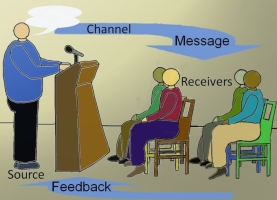 I recently spent 2 days in meetings with the North American members of my global team. There were a lot of presentations. A lot! One word that came up over and over again was the word: “Communication”. I have heard many presentations in my career on the importance of communication. But, one guy boiled it down very succinctly. And I loved the sense of urgency that it conveys.
I recently spent 2 days in meetings with the North American members of my global team. There were a lot of presentations. A lot! One word that came up over and over again was the word: “Communication”. I have heard many presentations in my career on the importance of communication. But, one guy boiled it down very succinctly. And I loved the sense of urgency that it conveys.
He said it this way:
- What do I know?
- Who needs to know it?
- Have I told them yet?
I thought that was pretty good. Effective communication is one of the key skills that a leader must possess if they are to be successful. So, let’s break it down.
What do I know? – As a leader, I have access to and am privy to things that the rest of the folks on my team do not have access to and are not privy to in their current roles. So, I must recognize that I have a duty to spread that knowledge when and where it is appropriate to do so.
Who needs to know it? – Not everyone needs to know what I know. And in many cases it would be detrimental to the team for them to know what I know. Personnel and salary information are the easy examples. But it goes well beyond those examples. The ones that need to know specific information are those who are somehow engaged in a project and need the information that you possess.
Have I told them yet? – This indicates that there is time sensitivity or an imperative to share the information when they are the right person to receive the information. So, do not delay. Share the information as quickly as you can because they may be waiting on that information in order to determine how best to proceed.
 But, I think that there may be a little more to the process than those three questions. In fact, I would add three more.
But, I think that there may be a little more to the process than those three questions. In fact, I would add three more.
- How can I tell them?
- How did they receive the message?
- Now what am I going to do?
How can I tell them? – This may be the most difficult part of the entre process. If the information will have lasting impact and that impact is negative, then I must find the best way to break that news to them and set the right tone for whatever will happen as a result of the information.
How did they receive it? – I have a responsibility as the communicator to do my very best to ensure that they receive the information in the best possible way. Sometimes leaders are the bearers of bad news. Projects get cancelled. People get laid off. Departments get consolidated. I must be attuned to how they are receiving this information.
Now what am I going to do? – The previous step began to provide me with the necessary feedback loop that is important in the overall communication process. But this goes beyond simple verbal or non-verbal feedback. As a leader, what am I going to do now once I have had to share some difficult news? How can I begin to help my team grieve if necessary or begin the process of rebuilding and moving on to the next project?
I realize that this took a decidedly somber tone and the assumption was that the information was negative. But there are very few ways to deliver happy and joyful news poorly. I know it can be done. But, you get my point.
Let’s try this coming week to work on our communication skills and see if we can become a little better at this really critical skill.
Photo credit: Foter / CC BY
Photo credit: Wesley Fryer / Foter / CC BY-SA
Photo credit: Wiertz Sébastien / Foter / CC BY



Please note: I reserve the right to delete comments that are offensive or off-topic.